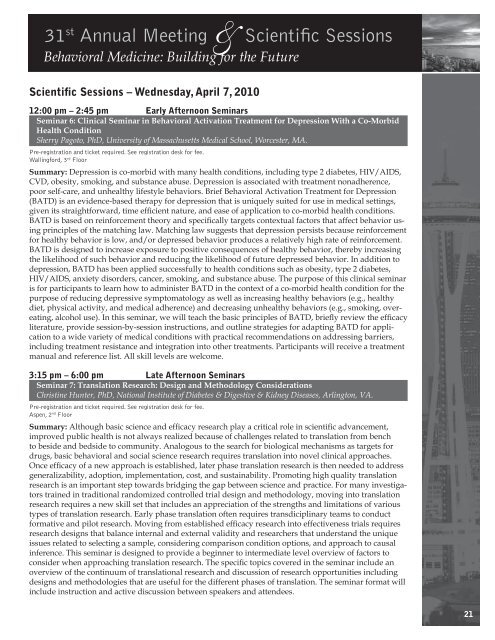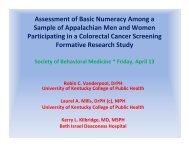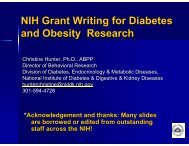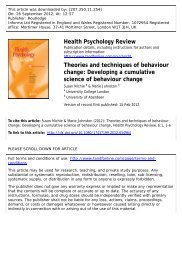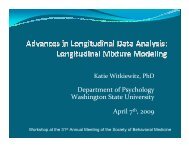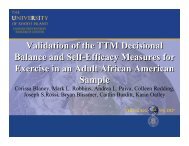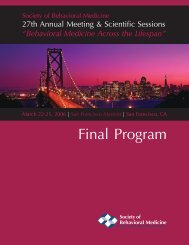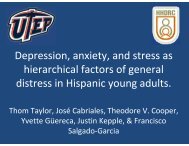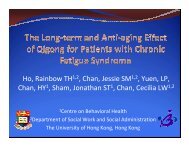FINAL PROGRAM - Society of Behavioral Medicine
FINAL PROGRAM - Society of Behavioral Medicine
FINAL PROGRAM - Society of Behavioral Medicine
You also want an ePaper? Increase the reach of your titles
YUMPU automatically turns print PDFs into web optimized ePapers that Google loves.
31 st Annual Meeting & Scientific Sessions<strong>Behavioral</strong> <strong>Medicine</strong>: Building for the FutureScientific Sessions – Wednesday, April 7, 201012:00 pm – 2:45 pm Early Afternoon SeminarsSeminar 6: Clinical Seminar in <strong>Behavioral</strong> Activation Treatment for Depression With a Co-MorbidHealth ConditionSherry Pagoto, PhD, University <strong>of</strong> Massachusetts Medical School, Worcester, MA.Pre-registration and ticket required. See registration desk for fee.Wallingford, 3 rd FloorSummary: Depression is co-morbid with many health conditions, including type 2 diabetes, HIV/AIDS,CVD, obesity, smoking, and substance abuse. Depression is associated with treatment nonadherence,poor self-care, and unhealthy lifestyle behaviors. Brief <strong>Behavioral</strong> Activation Treatment for Depression(BATD) is an evidence-based therapy for depression that is uniquely suited for use in medical settings,given its straightforward, time efficient nature, and ease <strong>of</strong> application to co-morbid health conditions.BATD is based on reinforcement theory and specifically targets contextual factors that affect behavior usingprinciples <strong>of</strong> the matching law. Matching law suggests that depression persists because reinforcementfor healthy behavior is low, and/or depressed behavior produces a relatively high rate <strong>of</strong> reinforcement.BATD is designed to increase exposure to positive consequences <strong>of</strong> healthy behavior, thereby increasingthe likelihood <strong>of</strong> such behavior and reducing the likelihood <strong>of</strong> future depressed behavior. In addition todepression, BATD has been applied successfully to health conditions such as obesity, type 2 diabetes,HIV/AIDS, anxiety disorders, cancer, smoking, and substance abuse. The purpose <strong>of</strong> this clinical seminaris for participants to learn how to administer BATD in the context <strong>of</strong> a co-morbid health condition for thepurpose <strong>of</strong> reducing depressive symptomatology as well as increasing healthy behaviors (e.g., healthydiet, physical activity, and medical adherence) and decreasing unhealthy behaviors (e.g., smoking, overeating,alcohol use). In this seminar, we will teach the basic principles <strong>of</strong> BATD, briefly review the efficacyliterature, provide session-by-session instructions, and outline strategies for adapting BATD for applicationto a wide variety <strong>of</strong> medical conditions with practical recommendations on addressing barriers,including treatment resistance and integration into other treatments. Participants will receive a treatmentmanual and reference list. All skill levels are welcome.3:15 pm – 6:00 pm Late Afternoon SeminarsSeminar 7: Translation Research: Design and Methodology ConsiderationsChristine Hunter, PhD, National Institute <strong>of</strong> Diabetes & Digestive & Kidney Diseases, Arlington, VA.Pre-registration and ticket required. See registration desk for fee.Aspen, 2 nd FloorSummary: Although basic science and efficacy research play a critical role in scientific advancement,improved public health is not always realized because <strong>of</strong> challenges related to translation from benchto beside and bedside to community. Analogous to the search for biological mechanisms as targets fordrugs, basic behavioral and social science research requires translation into novel clinical approaches.Once efficacy <strong>of</strong> a new approach is established, later phase translation research is then needed to addressgeneralizability, adoption, implementation, cost, and sustainability. Promoting high quality translationresearch is an important step towards bridging the gap between science and practice. For many investigatorstrained in traditional randomized controlled trial design and methodology, moving into translationresearch requires a new skill set that includes an appreciation <strong>of</strong> the strengths and limitations <strong>of</strong> varioustypes <strong>of</strong> translation research. Early phase translation <strong>of</strong>ten requires transdiciplinary teams to conductformative and pilot research. Moving from established efficacy research into effectiveness trials requiresresearch designs that balance internal and external validity and researchers that understand the uniqueissues related to selecting a sample, considering comparison condition options, and approach to causalinference. This seminar is designed to provide a beginner to intermediate level overview <strong>of</strong> factors toconsider when approaching translation research. The specific topics covered in the seminar include anoverview <strong>of</strong> the continuum <strong>of</strong> translational research and discussion <strong>of</strong> research opportunities includingdesigns and methodologies that are useful for the different phases <strong>of</strong> translation. The seminar format willinclude instruction and active discussion between speakers and attendees.21


